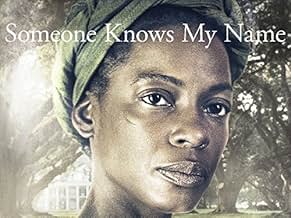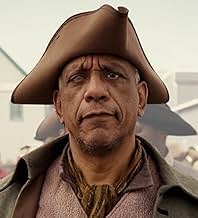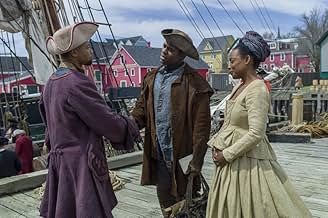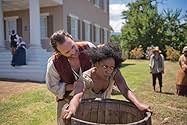The Book of Negroes
- टीवी मिनी सीरीज़
- 2015
- 44 मि
अफ्रीका में अपहरण कर लिया गया और बाद में दक्षिण कैरोलिना में गुलाम बना लिया गया, अमिनता को अठारहवीं शताब्दी में अपनी स्वतंत्रता को सुरक्षित करने के प्रयास में न्यूयॉर्क में क्रांति, नोवा स्क... सभी पढ़ेंअफ्रीका में अपहरण कर लिया गया और बाद में दक्षिण कैरोलिना में गुलाम बना लिया गया, अमिनता को अठारहवीं शताब्दी में अपनी स्वतंत्रता को सुरक्षित करने के प्रयास में न्यूयॉर्क में क्रांति, नोवा स्कोटिया में अलगाव और सिएरा लियोन के विश्वासघाती जंगलों से गुजरना होगा.अफ्रीका में अपहरण कर लिया गया और बाद में दक्षिण कैरोलिना में गुलाम बना लिया गया, अमिनता को अठारहवीं शताब्दी में अपनी स्वतंत्रता को सुरक्षित करने के प्रयास में न्यूयॉर्क में क्रांति, नोवा स्कोटिया में अलगाव और सिएरा लियोन के विश्वासघाती जंगलों से गुजरना होगा.
- पुरस्कार
- 19 जीत और कुल 26 नामांकन
एपिसोड ब्राउज़ करें
फ़ीचर्ड समीक्षाएं
Aminata Diallo (Aunjanue Ellis) is captured from her West African village and sent into slavery. She falls for Chekura, a boy in the slaving party. He in turn is also sold. She is sold to the cruel Robinson Appleby. She resists his advances and eventually has a child with Chekura. Rosa Lindo is a sympathetic white woman but she dies. Her husband Solomon is able to buy Aminata but also brokers the sale of Aminata's child away from Robinson. Aminata escapes from Solomon to live in NYC's Canvas Town during the American Revolution. She is befriended by Revolutionary bar owner Samuel Fraunces (Cuba Gooding, Jr.). Chekura manages to escape and join Aminata. She is also befriended by British Cpt. John Clarkson (Ben Chaplin). At the war's end, she helps to record names of slaves into the Book of Negroes for slaves who supposedly served the British Army for one year and thereby earning their freedom.
It's great for this little mentioned part of history to be made. Also Aunjanue Ellis is a very compelling actress. I can do without Cuba Gooding Jr. doing an accent. Also Rick Roberts doesn't fit my image of General Washington. Aminata directly challenging Washington on slavery seems too obvious and on the nose. It's unrealistic. The story is rushed through a long winding life. I can understand the need for it. However it does feel sometimes like a highlight reel. The production and directions are mostly TV movie level. Ellis is able to elevate the production almost by the sheer power of her will.
It's great for this little mentioned part of history to be made. Also Aunjanue Ellis is a very compelling actress. I can do without Cuba Gooding Jr. doing an accent. Also Rick Roberts doesn't fit my image of General Washington. Aminata directly challenging Washington on slavery seems too obvious and on the nose. It's unrealistic. The story is rushed through a long winding life. I can understand the need for it. However it does feel sometimes like a highlight reel. The production and directions are mostly TV movie level. Ellis is able to elevate the production almost by the sheer power of her will.
10cjde
my recorder is filled with quality Black history programming of all sorts. i love me some Black history like crazy but didn't think i needed to see another "slavery" story but boy was i wrong. this one was different! what an amazing story and very well done! lots of unexpected twists and turns and what a unique and amazing heroin Aminata Diallo was. wow!! that is a name i will never forget. i can't say that i have seen every movie or mini-series and i Roots is in a category by itself. it was an epic event - not just a miniseries. but Book of Negros was a really refreshing take on the slavery story, one that i am ashamed to admit i was totally unaware of. i can't wait to watch it with my daughter when she comes home for spring break. i did not expect a program of this quality from B.E.T. but was very pleasantly surprised. not sure what the ratings were but certainly help they will be encouraged do more stories like this that show the many and varied heroes and heroines that we are. Thank You B.E.T.!!! something i haven't said in many years, if ever!
Based on a bit of true history and a fictionalized book of the same name, this mini-series yields an aspect of the African slave story that I'd not known about before. Set in the late colonial / post-Revolutionary era, the story fills in some gaps left by Alex Haley's Roots chronicle.
No doubt legitimate criticism could be made of the film regarding its perhaps overly romanticized version of real life for African slaves in the colonies, and the multiple, implausible transatlantic voyages of the main character, and the surprise ending. If you can look past those flaws, the movie holds interest and the principal actors give engaging performances.
Two actual copies of the real Book of Negroes exist -- one in the National Archives in London, the other in National Archives in Washington DC.
No doubt legitimate criticism could be made of the film regarding its perhaps overly romanticized version of real life for African slaves in the colonies, and the multiple, implausible transatlantic voyages of the main character, and the surprise ending. If you can look past those flaws, the movie holds interest and the principal actors give engaging performances.
Two actual copies of the real Book of Negroes exist -- one in the National Archives in London, the other in National Archives in Washington DC.
I thought I had found the wrong series when first I saw lead actor Aunjanue Ellis on the DVD jacket-cover with a modern look (including makeup). A far cry from the book's original cover that included a modest, much darker-skinned woman whose look was to reflect that of being enslaved most of her life.
But that's just the start of my experience with this series.
I had read and enjoyed every gritty details of the book, simply because it was raw and heart-breaking, meant to make the reader feel something beyond their grasp. All of the ugly elements and consequences of rape, humiliation, personal loss, just to name a few things that rob someone of their dignity. The series seemed to cater to the ever-sensitive TV viewers who very likely needed to see slaves fully-clothed, clear-skinned, and bright-eyed. The series left out shocking details from the book, such as the infants that were thrown overboard (alive) on the first ship to the Americas. Once again, TV & Film find it too easy to spoon-feed the viewer only as much as they need to.
This series consisted of six episodes. Surely they had some time to show a few shocking moments from the book.
What's more, the very obvious sexual tension between Aminata and Sam seemed to be added for the viewers' pleasure since an absent husband just isn't as romantic.
These details that the readers of the book know about that the viewing audience doesn't makes me wonder if there ever will be a bridge between literature and screen-writing, as we see it time and time again.
I realize that this work is meant to be separate, and that Lawrence Hill did not write the screenplay, but I can't help but wonder why it is so necessary to take a subject as serious as this, during times like we are in now, and water it down with so much Hollywoodism.
My answer for those who read the book and wonder if they'll also enjoy the series?: No. I did give it two stars simply because I did enjoy the cast and for what it's worth, they did a good job. The costuming, cinematography, sound.. all of it good, but just a disappointment when you know how the story goes and end up with so much less than you hoped.
But that's just the start of my experience with this series.
I had read and enjoyed every gritty details of the book, simply because it was raw and heart-breaking, meant to make the reader feel something beyond their grasp. All of the ugly elements and consequences of rape, humiliation, personal loss, just to name a few things that rob someone of their dignity. The series seemed to cater to the ever-sensitive TV viewers who very likely needed to see slaves fully-clothed, clear-skinned, and bright-eyed. The series left out shocking details from the book, such as the infants that were thrown overboard (alive) on the first ship to the Americas. Once again, TV & Film find it too easy to spoon-feed the viewer only as much as they need to.
This series consisted of six episodes. Surely they had some time to show a few shocking moments from the book.
What's more, the very obvious sexual tension between Aminata and Sam seemed to be added for the viewers' pleasure since an absent husband just isn't as romantic.
These details that the readers of the book know about that the viewing audience doesn't makes me wonder if there ever will be a bridge between literature and screen-writing, as we see it time and time again.
I realize that this work is meant to be separate, and that Lawrence Hill did not write the screenplay, but I can't help but wonder why it is so necessary to take a subject as serious as this, during times like we are in now, and water it down with so much Hollywoodism.
My answer for those who read the book and wonder if they'll also enjoy the series?: No. I did give it two stars simply because I did enjoy the cast and for what it's worth, they did a good job. The costuming, cinematography, sound.. all of it good, but just a disappointment when you know how the story goes and end up with so much less than you hoped.
The Book of Negroes was an eighteenth century British document detailing all the Afro-Americans who had fought on the British side in the Revolutionary war, and were promised a new life elsewhere. A considerable number ended up in Nova Scotia and New Brunswick. There were problems with the harsh climate and petty racism, but it was better than the alternative.
This program takes its name from that, and the first episode looks quite satisfying, as we trace a black girl's odyssey from Mali to America.
So far, it does not seem much different from Roots, but I will keep watching to see if something original turns up.
This program takes its name from that, and the first episode looks quite satisfying, as we trace a black girl's odyssey from Mali to America.
So far, it does not seem much different from Roots, but I will keep watching to see if something original turns up.
क्या आपको पता है
- ट्रिवियाBased on the name of the book that really existed, that had the names of Negroes who served the British during the Civil War, then were freed and sent to Nova Scotia to live. Publishers changed the name of the book from "Book of Negroes" to "Someone Knows My Name" because the term "Negro" has become a derogatory term to many people in the U.S., and sellers were hesitant to sell a book with that word in the title.
टॉप पसंद
रेटिंग देने के लिए साइन-इन करें और वैयक्तिकृत सुझावों के लिए वॉचलिस्ट करें
- How many seasons does The Book of Negroes have?Alexa द्वारा संचालित
विवरण
- रिलीज़ की तारीख़
- कंट्री ऑफ़ ओरिजिन
- भाषा
- इस रूप में भी जाना जाता है
- Someone Knows My Name
- फ़िल्माने की जगहें
- उत्पादन कंपनियां
- IMDbPro पर और कंपनी क्रेडिट देखें
इस पेज में योगदान दें
किसी बदलाव का सुझाव दें या अनुपलब्ध कॉन्टेंट जोड़ें

































